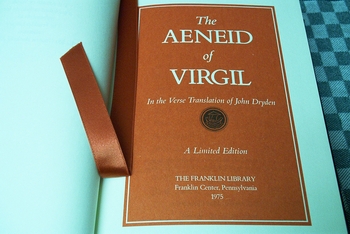Easton Press Virgil books
The Aeneid - 100 Greatest Books Ever Written - 1979Franklin Library Virgil books
The Aeneid - 100 Greatest Books of All Time - 1975The Eclogues and The Georgics - Great Books of the Western World - 1981
Virgil biography
Publius Vergilius Maro, known to the world as Virgil, stands as one of ancient Rome's most revered poets, celebrated for his profound influence on literature, culture, and the imagination of Western civilization. Born on October 15, 70 BCE, in a small village near Mantua, Virgil's life and work would come to epitomize the heights of Roman literary achievement. Virgil's early years were marked by a deep appreciation for the pastoral beauty of the Italian countryside and a voracious appetite for learning. Under the tutelage of the finest scholars of his day, he honed his skills in rhetoric, philosophy, and literature, laying the groundwork for a career that would leave an indelible mark on the world.Virgil's crowning achievement came in the form of his epic poem, The Aeneid, a monumental work that would come to be regarded as one of the greatest masterpieces of Western literature. Commissioned by Emperor Augustus to glorify Rome's mythical origins and legitimize his rule, The Aeneid weaves a rich tapestry of myth, history, and prophecy, tracing the legendary journey of the Trojan hero Aeneas from the ruins of Troy to the shores of Italy. In The Aeneid, Virgil explores timeless themes of destiny, duty, and the inexorable march of history, capturing the essence of the Roman spirit and the grandeur of its imperial ambitions. His masterful use of language, imagery, and symbolism elevates the poem to the status of a national epic, inspiring generations of poets, scholars, and statesmen with its stirring portrayal of heroism, sacrifice, and the triumph of the human spirit.
Virgil's influence extended far beyond The Aeneid, encompassing a diverse body of work that includes pastoral poetry, didactic verse, and philosophical treatises. His enduring legacy as a poet, scholar, and sage continues to resonate to this day, as readers around the world continue to find solace, inspiration, and enlightenment in his timeless words and timeless wisdom. Virgil passed away on September 21, 19 BCE, before completing the final edits of The Aeneid. Despite his premature death, his legacy as one of the greatest poets of antiquity endures, a testament to the enduring power of his art to illuminate the human condition and transcend the boundaries of time and space.
The Aeneid of Virgil
The Aeneid by Virgil, the great national epic of Rome, composed between the years 29 and 19 B.C. by the poet Publius Virgilius Maro, more commonly known as Virgil. The epic was left without final revision upon Virgil's death in 19 B.C. The Aeneid is a mythological work in twelve books, describing the wanderings of the hero Aeneas and a small band of Trojans after the fall of Troy. Aeneas escaped from Troy with the images of his ancestral gods, carrying his aged father on his shoulders, and leading is young son Ascanius by the hand, but in the confusion of his hasty flight he lost his wife, Creusa. Having collected a fleet of twenty vessels, he sailed with the surviving Trojans to Thrace, where he began building a city. He subsequently abandoned his plan of a settlement there and went to Crete, but was driven from the island by a pestilence. After visiting Epirus, and Sicily, where his father died, he was shipwrecked on the coast of Africa and welcomed by Dido, Queen of Carthage. After a time he again set sail; Dido who had fallen in love with him was heartbroken by his departure, and committed suicide. After visiting Sicily again and stopping at Cumae, on the Bay of Naples, he landed at the mouth of the Tiber River, seven years after the fall of Troy, and there was welcomed by Latinus, King of Latium. Latvinia, the daughter of Latinus, was destined to marry a stranger, but her mother Amata had promised to give her in marriage to Turnus, King of the Rutulians. A war ensued, which terminated with the defeat and death of Ternus, thus making it possible the marriage of Aeneas and Lavinia. Aeneas died three years later, and his son Ascanius founded Alba Longa, the mother city of Rome.Virgil's Aeneid derives its plan of style and treatment from the Iliad and less from the Odyssey, the great epics of Greek poet Homer. Virgil was partly influenced also by the epic poem Argonautica of the Greek poet Apollonius of Rhodes, and the Annals of the Roman poet Quintus Ennius, who was the first to introduce dactylic hexameter into Latin epic verse. In the Aeneid, Virgil developed both the music and the technical precision of this meter so subtly that his verse ever since has been considered a model of literary perfection. Virgil's Aeneid is usually regarded as the first great literary epic, in contrast to the Iliad, which is constructed with literary artistry but contains a great number of usages and forms found in earlier oral poetry. It is not , as that poem was from the Greeks, an inherited part of the national consciousness, but a deliberate attempt to glorify the nation and particularly to celebrate the achievements and ideals of the Roman state under the emperor Augustus. The historical and Augustan elements are especially prominent in the central section of books 5-8.
Because of its ambitious design, the smooth beauty of its style, and its tenderness of feeling, the Aeneid is known as one of the greatest masterpieces of world literature.
Virgil's Aeneid was highly appreciated in its own day. To judge from the fine quality of numerous manuscripts dating from the 3rd to the 5th century A.D., and the numerous references by later Roman writers, the Aeneid was popular for along time after its composition. During the Middle Ages hidden philosophical meanings were read into the poem, and Virgil himself was thought to be a seer and a magician. The importance of the Aeneid in the history of English poetry has been considerable. The English poet Geoffrey Chaucer told part of the story in his House of Fame. Edmund Spenser, in The Faerie Queene, was indebted to Virgil's conception of the epic as a national poem. The style and technique of versification practiced by such poets as John Milton and Alfred, Lord Tennyson were influenced by the Latin of Virgil's Aeneid. The work has been in widespread use a school text for centuries. Notable translations of the poem include those by John Dryden, William Morris, and Cecil Day Lewis.
Virgil quotes
"Fortune sides with him who dares." (Latin: "Audentes fortuna iuvat.")
"Love conquers all; let us too surrender to love." (Latin: "Amor vincit omnia; et nos cedamus amori.")
"Perhaps one day it will be pleasant to remember even this." (Latin: "Forsan et haec olim meminisse iuvabit.")
"Do not yield to evil, but attack it boldly." (Latin: "Neque enim levia aut ludicra petuntur / praemia, sed duris doloribus adiungitur auctor / exercitus.")
"The greatest wealth is health." (Latin: "Mens sana in corpore sano.")
"Death twitches my ear; 'Live,' he says... 'I am coming.'" (Latin: "Fugit hora; carpe diem; quam minimum credula postero.")
"Love is a kind of warfare." (Latin: "Amor omnibus idem.")
"Believe one who has proved it. Believe an expert." (Latin: "Fidem qui per has, duxit, non repperit, uni.")



Comments
Post a Comment
Share your best book review and recommendation